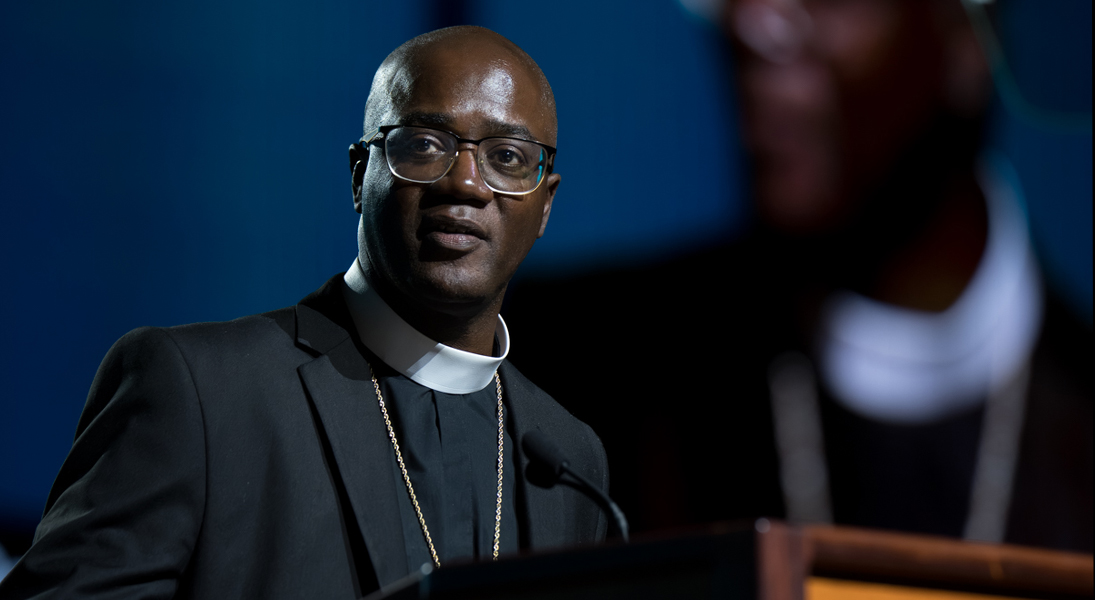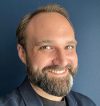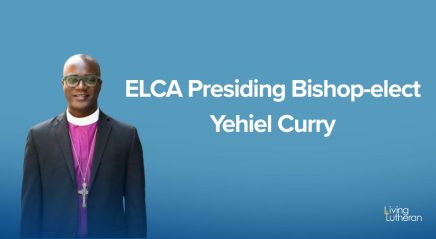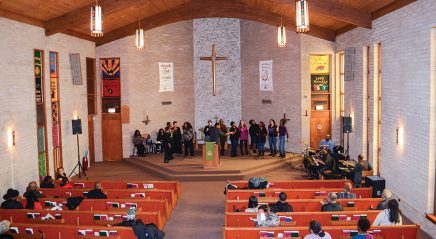When Yehiel Curry considers his vision for the future of the church, he sees an important distinction. “Part of the work is naming it,” he said, “but that next phase is embodying it.
“When we’re talking about casting a vision, I think people want to be part of a vision because they want to share in the process. But they typically will also share in the burdens as well. So part of my vision is [about] those things we’ve lifted up as a church that we said we need to do, we’re going to do, and find a way to bring more people to the table so that we might embody that work instead of it just being a written document.”
Curry, who was elected July 30 to serve a six-year term as ELCA presiding bishop, knows something about embodying a vision and discerning a call.
Before he became a pastor, then a bishop, then the chair of the Conference of Bishops, and now presiding bishop-elect, he was a social worker, then a teacher, then in sales. “I went from being a social worker to a teacher in the same community where I was helping those families, and in both cases, what I learned is passion is very important. And if you can align a person’s passion with a need, then it doesn’t feel like work sometimes.
“It wasn’t until I was in the church that I said, ‘I could do this for the rest of my life.’”
“It wasn’t until I was in the church that I said, ‘I could do this for the rest of my life.’”
Curry wrestled with the passion he feels for his current ministry as he discerned his new call in the days leading up to the 2025 Churchwide Assembly. “I take my role [as bishop of] the Metropolitan Chicago Synod very seriously,” he said. “And I started the process of thinking about what the next six months would look like, even the next year. And some people discern differently. I didn’t have some voice saying to me, ‘Here’s what you ought to do.’ But last Friday, what started to happen was the calls of family, friends and mentors—the nudging, the text messages, the emails—served as a form of discernment for me.”
“I only arrived at this place Friday or Saturday where I felt like maybe this is something I should do,” he said of being considered for presiding bishop.
Now that Curry has been elected the fifth presiding bishop of the ELCA—and the first of African descent—how does he feel? “That reality hasn’t really set in,” he said. “Even at this moment, I’m feeling a certain kind of way in understanding the weight and the impact.
“I’m hopeful that, if presence matters, me being here does something for allowing others to consider, ‘Someone who looks like me, or is from my community, or speaks with an accent, or their mother tongue isn’t English [could take on a similar role].’ Hopefully that’s what that means.”
A return on investment
An immediate answer comes to mind for Curry when asked about what he believes should be among the ELCA’s top priorities. “I think there’s this unique opportunity around lay equipping and lay education,” he said. “The ethos and the structures of many of our congregations are changing. In some cases, they’ve gone from full-time pastors to part-time pastors; we have leaders who are serving two- and three-point congregations.
“Our lay leaders are being asked to do more. And in many cases, they’re saying, ‘Yes, I want the education—as long as you’re not trying to steer me and tell me I need to be a pastor or a deacon. Tell me how to be a better leader in my community, in my context.’”
Curry’s passion for, and awareness of, equipping lay leaders stems from his own ministry beginnings.
He was a Chicago Public Schools teacher when he first visited Shekinah Chapel, then a synod-authorized worshiping community. “I didn’t even realize it was Lutheran,” he said. “I was invited by a friend.” What drew him to Shekinah was Safe in My Brother’s Arms (SIMBA), a mentoring program there sponsored by the ELCA. “I had these unique students,” he said. “And I was interested in services for them. … There was a worship service I stayed for. And I loved it.”
Curry went home and told his wife, LaShonda, about the great experience he had had there, and they returned together the following weekend. “We came back and joined,” he said. “And we didn’t understand the organizations of the Lutheran church. We just saw a home, we saw a community.”
Eventually, the community, and the synod staff, asked Curry to consider being a lay mission developer. He was unsure. “I knew I had this thing in my heart, but I didn’t have the right vocabulary for it,” he said. “I didn’t know that I was actively discerning and that I was being called into this ministry.”
“I didn’t know that I was actively discerning and being called into this ministry.”
After becoming mission developer, Curry enrolled in the Theological Education for Emerging Ministries program at the Lutheran School of Theology at Chicago and received his ordination certification in 2009. In 2012, when Shekinah became an official ELCA congregation, it called Curry to be its pastor. He served in that role until he was elected bishop of the Metropolitan Chicago Synod in 2019.
“This was a process I was honored to be involved in, because I didn’t think many people knew who I was,” he said. “I was working in poverty ministry in the outskirts of Chicago. So it was an honor to have my name lifted up and to ultimately be elected bishop.” In 2024, he was elected chair of the ELCA Conference of Bishops.
Curry recalled his ministry trajectory, and the initial hesitation he felt in accepting that first role, when he addressed the 2025 Churchwide Assembly following his election.
“I’m what a return on your investment looks like,” he told the assembly. “Perhaps I’m out there in one of you. I never saw myself as good enough, so for two years, I said no. I finally said yes. When I said yes, your support, this church’s support, of that ministry meant everything. So if you want to know what your benevolence dollars look like, it looks like me. And I want to say thank you. Thank you for your investment.”
Curry will be installed Oct. 4 at Central Lutheran Church in Minneapolis.









